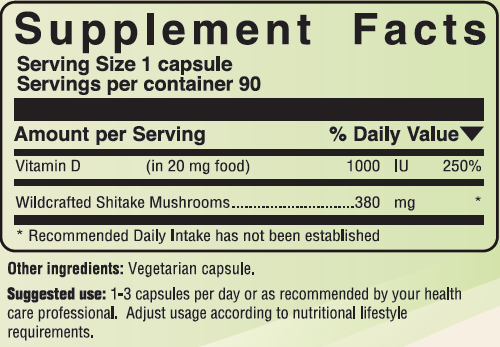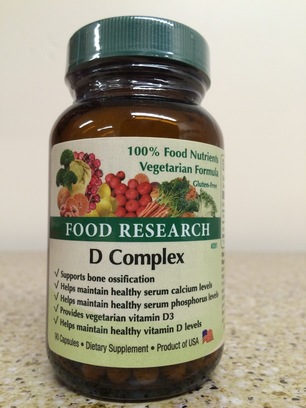
D Complex TM
90 Capsules $32.98
90 Capsules $32.98
100% Food D Complex is a natural, vegetarian, Food complex source of vitamin D. Nearly all other vitamin D sources are synthetic or animal source.
“The principal physiological function of vitamin D in all vertebrates, including humans, is to maintain serum calcium and phosphorus concentrations in a range that supports cellular processes, neurological function, and bone ossification. Vitamin D accomplishes this goal by enhancing the efficiency of the small intestine to absorb dietary calcium and phosphorus and by mobilizing calcium stores from the bone” [1].
Clinically, food vitamin D has been used for problems including:
* Hyperirritability (insomnia, restlessness, tachycardia, cramps)
* Tetany (muscle spasms)
* Bone disorders (osteoporosis)
* Lung conditions (bronchitis)
* Lowered resistance (worse in winter due to lack of sunshine)
* Indoor living (avoidance of exposure to sunshine)
* Hypotension
* Epistaxis (nosebleeds)
* Delayed healing (bed sores, ulcers, etc.) [2].
“The synthetic forms of vitamin D have been found to be toxic” [2]. Food vitamin D has been reported to raise blood calcium levels, promote the absorption of calcium, and cooperates with essential fatty acids (consider Omega 3/ EPA/ DHA) in calcium metabolism [2].
Vitamin D is the sunshine vitamin, meaning that people who get sufficient sun exposure and have no problems converting cholesterol into vitamin D will normally have sufficient vitamin D [1]. However, because of Western lifestyles, many people simply are deficient in vitamin D.
The PDR claims, “Very few foods are natural sources of vitamin D...Vitamin D3 is derived from animal sources” [3]. That is almost true. There are very few foods that naturally contain vitamin D, but one vegetarian food does.
Other than sunshine, there is really is one vegetarian source of vitamin D3 and that is from nutritional yeast. Any product that says that it is yeast-free is either ignoring the fact that vitamin D is derived from specially-grown yeast or is not truly vegetarian.
Why?
Because, outside of yeast sources, most vitamin D in supplements comes from a process of irradiating animal fat (normally from either pigs or sheep), although for some supplements, fish oils are sometimes used.
And while D Complex contains vitamin D in the same bio-chemical form that it is found in fish oils [3], it is 100% vegetarian and not a fish oil derivative. D Complex contains vitamin D as cholecalciferol (D3).
Forms of USP Vitamin D
The first USP form of vitamin D, vitamin D1 did not even have the ability to prevent rickets [1]. And even though they put it in milk to prevent rickets it took decades for the mainstream to realize that it did not have antirachitic activity.
“At the time of its identification, it was assumed that the vitamin D made in the skin during exposure to sunlight was vitamin D2”, but it was later learned that human skin produced something called vitamin D3 [1]. It was first believed by mainstream researchers that provitamin D3 was directly converted to vitamin D3, but that was incorrect. The skin actually contains a substance commonly called provitamin D3; after exposure to sunlight previtamin D3 is produced and it begins to isomerize into vitamin D2 in a process which is temperature dependent, with isomerized vitamin D3 being jettisoned from the plasma membrane into extracellular space--exposure to sunlight is the main way that humans naturally receive vitamin D. Synthetic vitamin D2 was used to fortify milk in the US and Canada for about forty years until it was learned that D3 was the substance which had better antirachitic activity, so D3 has usually been used for the past twenty years [1].
Synthetic, USP Vitamin, D1 is made by irradiating fungal sterol ergosterol and processing it with benzene [1,4]. Vitamin D2 is made by bombing ergosterol with electrons [4] and is “recovered by solvent extraction” [5]. Vitamin D3 and Vitamin D4 are both often made through irradiating animal fat [3,4,6] or through irradiating “the spinal cords and brains of cattle” [5]. USP forms of vitamin D are always isolates, even though vitamin D is not really an isolate [1].
Not only is D Complex not an isolate, D Complex is strictly vegetarian andhas over 10 times the antirachitic effects of some forms of USP vitamin D [7].
Other Foods
In addition to specially-grown and harvested nutritional yeast, D Complex contains alfalfa which is one of the best plant sources of calcium and trace minerals [8], “The calcium is used as a carrier for the vitamin D” [2]. “In humans, alfalfa has shown the ability to lower serum cholesterol” [9].
Guar gum seed is extracted from locust beans. It improves “tolerance to glucose by decreasing absorption” [10] and has a demonstrated lipid lowering effect [3].
Rice bran is a natural source of potassium, phosphorus, silicon, magnesium and other substances [11-12] helpful in bone support.
D Complex is a truly vegetarian Food source of vitamin D.

References
[1] Holick M.F. Vitamin D. In: Modern Nutrition in Health and Disease, 10th ed. Lippincott Williams & Wilkins, Balt., 2006: 376-411
[2] Lee R. Vitamin D Complex. Lee Foundation for Nutritional Research, Milwaukee, circa 1950
[3] Hendler SS, Rorvik D, eds. PDR for Nutritional Supplements. Medical Economics, Montvale (NJ), 2001
[4] Budvari S, et a; editors. The Merck Index: An Encyclopedia of Chemicals, Drugs, and Biologicals, 12th ed. Merck Research Laboratories, Whitehouse Station (NJ), 1996
[5] Vitamin-Mineral Manufacturing Guide: Nutrient Empowerment, volume 1. Nutrition Resource, Lakeport (CA), 1986
[6] Fioravanti L, Miodini P, Cappelletti V, DiFronzo G. Synthetic analogs of vitamin D3 have inhibitory effects on breast cancer cell lines. Anticancer Res, 1998;18:1703-1708
[7] Thiel R. Vitamin D, rickets, and mainstream experts. Int J Naturopathy, 2003; 2(1)
[8] Pedersen M. Nutritional Herbology. Whitman Books, Warsaw (IN), 1994
[9] Gruenwald J, et al. PDR for Herbal Medicines, 2nd ed. Medical Economics, Montvale (NJ), 2000
[10] Trinick TR, Laker MF, Johnston DG, Keir M, Buchanan KD, Alberti KG. Effect of guar on second-meal glucose tolerance in normal man. Clin Sci (Lond). 1986;71(1):49-55
[11] Jensen B. The Chemistry of Man. Bernard Jensen, Escondido, 1983
[12] Rice bran, crude. USDA National Nutrient Database for Standard Reference, Release 18 (2005)
Some of these studies (or citations) may not conform to peer review standards (though most do). Therefore, the results are not conclusive. Professionals can, and often do, come to different conclusions when reviewing scientific data. None of these statements have been reviewed by the FDA. All products distributed by Doctors’ Research, Inc. are nutritional and are not intended for the treatment or prevention of any medical condition.
 |
||
|
||
